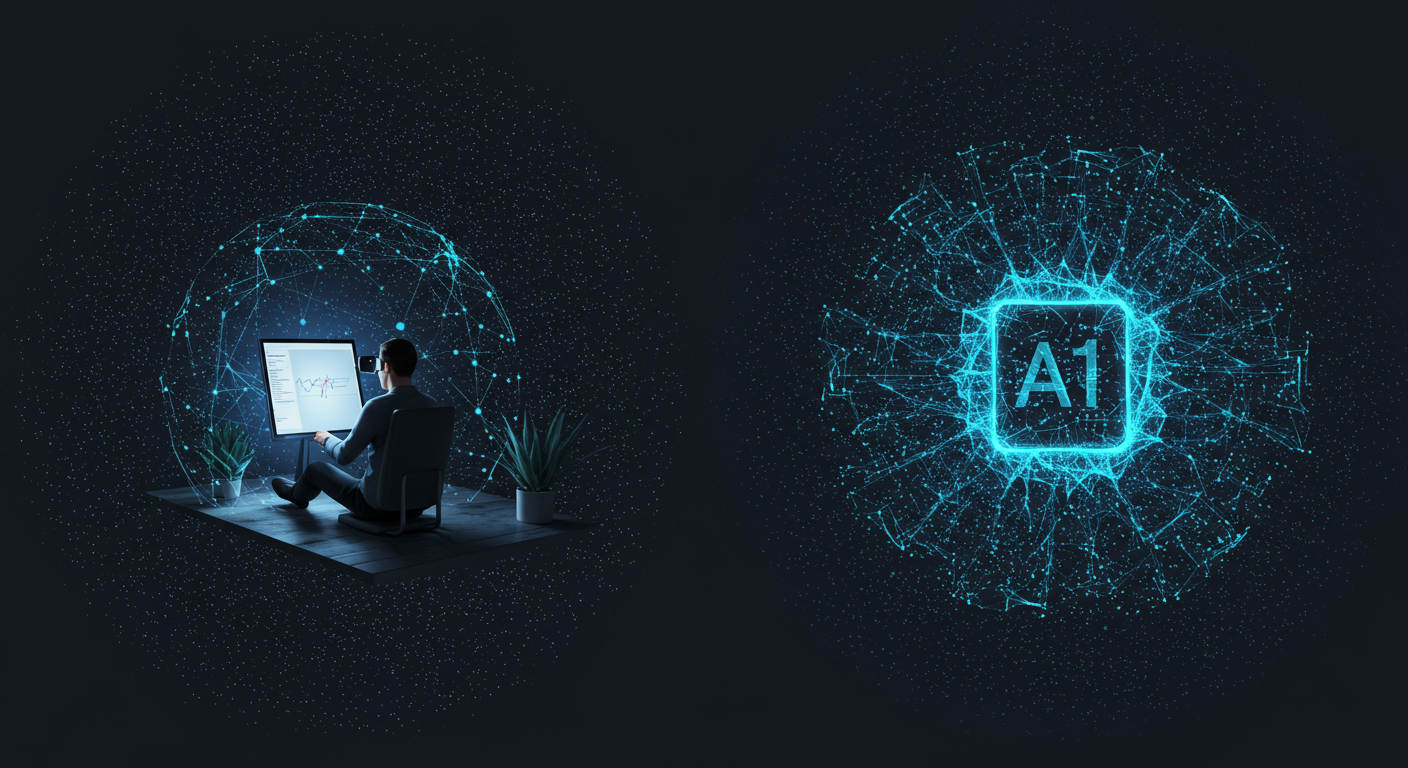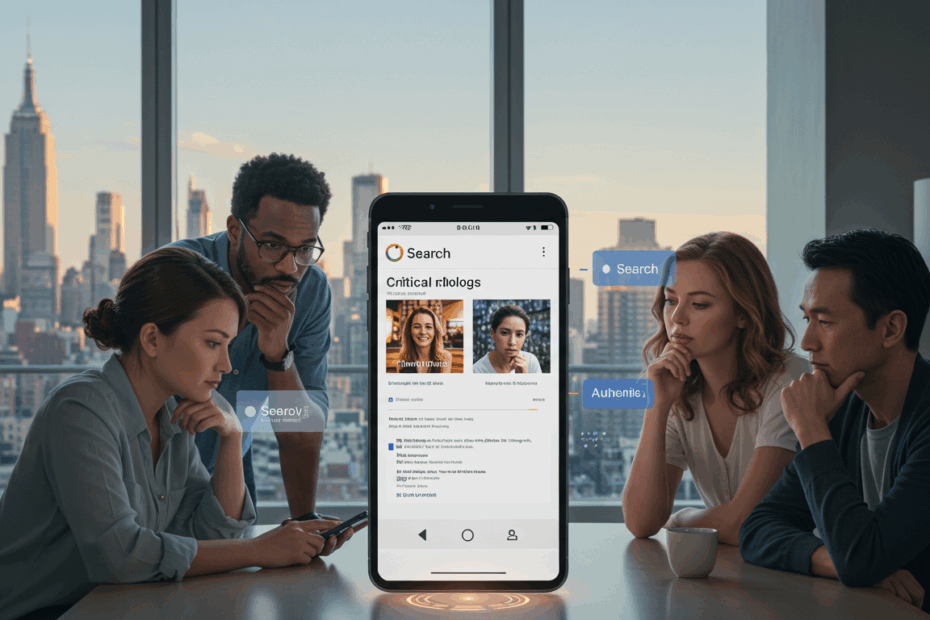Is This the End of Search as We Know It? Why U.S. Adults Don’t Trust SEO Anymore
John: Welcome, everyone. For decades, the pact between search engines and users was simple: you ask a question, we give you a list of the best possible answers. But that pact is fraying. We’re seeing a significant cultural shift, particularly among U.S. adults, that can be summed up by a rather blunt observation: when it comes to modern search results, many U.S. adults simply don’t trust them. This isn’t just a feeling; the data is starting to paint a clear picture of skepticism and changing habits, a trend we’re exploring today.
Lila: That’s a huge claim, John! I mean, Google is practically a verb. We all use it every day. When you say “U.S. adults don’t trust SEO,” are you saying people think it’s all a scam? I thought Search Engine Optimization (SEO) was just about helping good content get found. Where is this distrust coming from? It feels like a sudden change.
John: It feels sudden, but the undercurrents have been building for years. SEO, in its purest form, is exactly what you said: helping quality content rise. But in practice, it has often become a game of reverse-engineering algorithms, sometimes at the expense of user experience. The rise of AI-generated content has supercharged this perception. Now, users are confronted with a search results page that feels less like a library curated by experts and more like a chaotic marketplace where everyone is shouting for attention. The core issue is a perceived loss of authenticity.
Lila: So, it’s not that people hate the idea of organizing information, but they hate the feeling of being “marketed to” when they’re just trying to find a simple answer? Like when you search for a recipe and have to scroll through someone’s entire life story, which you know is just stuffed with keywords. It’s exhausting!
John: Precisely. That exhaustion is a key factor. Users are becoming more aware of the mechanics behind the curtain. They see the keyword-stuffing, the thin content designed purely to rank, and the endless affiliate links. This erosion of trust is creating a fascinating new landscape for how we find information online, and it’s forcing a long-overdue conversation about what we want from our search engines in the age of AI.

The Data Behind the Distrust
Lila: Okay, you mentioned data. I’m a “show me the numbers” kind of person. What specific statistics are we talking about here? How widespread is this sentiment among U.S. adults?
John: The numbers are compelling and point to a clear trend. For instance, recent studies from respected sources like SEO.com highlight a crucial figure: **28% of U.S. adults don’t trust AI-generated search results**. That’s nearly a third of the adult population looking at the new AI Overviews from Google and feeling wary. They’re not sure if the information is accurate, unbiased, or just a summary of other potentially flawed content. This isn’t a niche concern; it’s a mainstream sentiment.
Lila: Wow, 28% is a significant number. So when Google’s new AI answers pop up, a lot of people are immediately suspicious. Does this distrust extend beyond just the AI features? What about the classic “ten blue links”?
John: It absolutely does, and that’s where another critical concept comes into play: the “zero-click search.” Data from 2024 showed that nearly 60% of Google searches in the U.S. resulted in zero clicks. This means the user found their answer directly on the search results page (the SERP) itself—in a featured snippet, a knowledge panel, or now, an AI Overview—and never clicked through to a website. While convenient, this starves creators and businesses of traffic and reinforces the idea that Google is the source of truth, not the websites it indexes.
Lila: So, on one hand, people don’t trust the new AI answers. But on the other hand, they’re increasingly not even clicking the links to verify the information for themselves? That seems like a contradiction. How can both be true?
John: It’s the core paradox of the modern web user: we’re simultaneously skeptical and convenience-driven. We might not fully trust the AI summary, but if it’s “good enough” for a quick answer, we’ll take it and move on. The distrust comes into play for more complex or high-stakes queries. For a simple fact, like “What is the capital of Australia?”, the AI answer is fine. For “What is the best treatment for acid reflux?”, the skepticism kicks in hard. Furthermore, there’s a statistic that suggests up to **41% of U.S. adults don’t** necessarily click the first organic result, indicating a breakdown in the belief that the top spot is always the best or most relevant answer.
The Technical Mechanism: From SEO to SGE to AI Overviews
John: To understand why this is happening, we need to look at the technology. For twenty years, SEO was primarily about convincing Google’s algorithm that your webpage was the most authoritative answer to a specific query. This involved on-page factors (like keywords and content quality), off-page factors (like backlinks, which are links from other sites), and technical aspects (like site speed).
Lila: Right, the classic SEO playbook. Get good backlinks, write long articles, make sure your title tag is perfect. I learned about that in my digital marketing class. So what broke?
John: What broke is that the game changed. Google introduced what it initially called the Search Generative Experience (SGE), which has now evolved into “AI Overviews.” Instead of just ranking links, the engine now uses a large language model (LLM) to read and synthesize information from multiple top-ranking pages and present a direct, conversational answer at the very top of the page. This fundamentally alters the goal. The target is no longer to be the #1 link; it’s to be a source for the AI’s summary.
Lila: So you’re saying that all those websites that fought so hard to get to the top of Google are now just… raw material for Google’s AI to use? And they might not even get a click out of it? That sounds brutal for publishers and small businesses.
John: It is, and it’s the central conflict right now. While Google does provide citations or links within the AI Overviews, click-through rates are expected to be much lower. This shift demotes websites from being the destination to being a footnote. It also introduces new problems. We’ve all seen the viral examples of AI Overviews giving dangerous or nonsensical advice, like putting glue on pizza, because the AI misinterpreted satirical or incorrect information from the websites it scraped. This is the technical mechanism that is actively eroding user trust.
Lila: It’s like the AI is a research assistant who is very fast but doesn’t have any common sense or fact-checking ability. It just summarizes what it reads, regardless of whether the source was The Onion or The New York Times. No wonder why U.S. adults don’t feel confident in those answers. It makes the classic list of links, where you could at least judge the source domain yourself, seem much safer in comparison.

The “Team” vs. The Community: A Growing Disconnect
John: That’s a great analogy, Lila. And it brings us to the human element. You have “Team Google” and “Team SEO” on one side, who see this as a technological evolution towards a more efficient “answer engine.” Their goal is to solve the user’s query as quickly as possible on the results page. On the other side, you have the community of users, creators, and publishers.
Lila: And that community seems to be splitting. I’ve noticed on platforms like Reddit and TikTok, people aren’t even starting with Google anymore. They’re adding “reddit” to their search queries to find real human discussions and opinions, not a perfectly optimized but soulless blog post. Is that part of this trend?
John: It’s a massive part of it. This is what some are calling “Search Everywhere Optimization.” The community is actively seeking out platforms they perceive as more authentic. A user looking for a review of a new video game might trust a Reddit thread or a YouTube video from a passionate gamer more than a corporate review site that’s monetized with affiliate links. The “community” trusts other humans. The rise of social search is a direct response to the perceived over-optimization and de-humanization of traditional web search. The community feels that SEO, U.S. adults don’t get a fair shake from the system, so they’re building their own.
Lila: So “Team SEO” is playing a game that the “Community” no longer wants to watch, let alone play. And now “Team Google” is changing the rules of the game entirely with AI, which seems to alienate the community even more. It sounds like a feedback loop of distrust. What can content creators even do? Just start posting everything on Reddit and TikTok?
John: That’s the million-dollar question. The smart strategy isn’t to abandon one for the other, but to build a brand and a community across multiple platforms. Be where your audience is. If they’re seeking authentic conversations on Reddit, be there to participate genuinely. If they’re looking for visual guides on YouTube, create them. The old model was to funnel everyone to your website through Google. The new model is to distribute valuable content across the “everywhere” that users are now searching, building brand trust directly with the community, not just with an algorithm.
Use-Cases and Future Outlook: Is SEO Actually Dead?
John: This inevitably leads to the perennial question that pops up every few years: “Is SEO dead?” We’re hearing it louder than ever in 2025. The short answer is no. But the SEO that many knew—focused on rigid technical rules and keyword density—is certainly dying, if not already dead. It’s being replaced by something much broader.
Lila: Which is this “Search Everywhere Optimization” you mentioned? So instead of just optimizing for Google, you’re optimizing for YouTube, TikTok, Reddit, Amazon, maybe even AI assistants like ChatGPT? That sounds incredibly complex.
John: It is more complex, but it’s also more holistic. The future is about brand authority and content quality, regardless of the platform. The use-case is no longer “How do I rank #1 for this keyword?” It’s “How do I become the most trusted, go-to source for my topic?” If you achieve that, you’ll naturally perform well across all these search modalities. Google’s own AI will be more likely to cite you if you’re widely recognized as an authority. People on Reddit will recommend you. Your YouTube videos will get shared. The focus shifts from technical tricks to building genuine E-E-A-T (Experience, Expertise, Authoritativeness, and Trustworthiness).
Lila: That actually sounds… better? It sounds more honest. It means the people who actually know what they’re talking about should, in theory, win out over the people who are just good at gaming the system. Is that a realistic outlook, though? Or will new ways to “game the AI” just emerge?
John: It’s a bit of both. New manipulation tactics will always emerge, but the barrier to entry is higher. It’s much harder to fake genuine authority across multiple platforms than it is to stuff keywords onto a webpage. The future outlook is one where technical SEO becomes table stakes—your site still needs to be fast and accessible—but the real differentiator will be the quality and resonance of your content with human beings. The brands that understand this will thrive. The ones that keep trying to play the old game will find their traffic dwindling to nothing.
Competitor Comparison: Google vs. The World
Lila: So if people are so fed up with Google, what are the real alternatives they’re using? I use ChatGPT for brainstorming, but I’m not sure I’d use it to find a local plumber. What does the competitive landscape look like?
John: It’s a fascinating and rapidly diversifying field. We can break it down into a few key categories:
- Traditional Search (Evolving): This is still Google and Bing’s territory. They are integrating AI but still rely on their massive web indexes. Their strength is their scale, but their weakness is the trust issue we’ve been discussing.
- AI-First Answer Engines: This is where companies like Perplexity AI shine. They were built from the ground up to be conversational and to synthesize information, always providing clear source citations. Many users find their interface cleaner and their answers more direct, without the traditional ad clutter.
- LLM Chatbots as Search: This includes ChatGPT, Claude, and others. While not their primary function, millions of people use them for search-like queries. One study from Writesonic noted that 18% of U.S. adults use AI tools as their primary search tool. Their strength is conversational depth, but their weakness can be “hallucinations” (making things up) and a lack of real-time information.
- Social & Community Platforms: This is the TikTok, Reddit, and YouTube search phenomenon. Their strength is authenticity and user-generated content. Their weakness is a lack of structure and the potential for wading through a lot of noise and misinformation to find a gem.
Lila: It seems like there’s a trade-off with every option. Google is cluttered but comprehensive. Perplexity is clean but maybe less exhaustive. ChatGPT is conversational but can be unreliable. And Reddit is “real” but chaotic. So people are using different tools for different jobs?
John: Exactly. There’s no single “Google killer.” Instead, we’re seeing a fragmentation of search behavior. You might use Google to check flight times, Perplexity to research a complex topic for a paper, TikTok to find a new recipe, and Reddit to troubleshoot your computer. This is why the idea that SEO, U.S. adults, don’t just stick to one platform is so critical. The monolithic search behavior of the past is gone.

Risks, Cautions, and Finding Truth
John: This fragmentation, while empowering in some ways, comes with significant risks. The most prominent is the potential for creating personalized echo chambers on an unprecedented scale. If an AI is only ever feeding you information that aligns with your past queries and perceived biases, it can wall you off from differing viewpoints and essential facts.
Lila: That’s scary. We already see that with social media feeds. If AI search does the same thing, how do we ever find objective truth? If I’m searching for information on a controversial topic, I could get a completely different AI-generated reality than someone else.
John: That is the fundamental caution. Another risk is the laundering of misinformation. A piece of fake news could be published on a few low-quality blogs, scraped and synthesized by an AI, and then presented as a factual-sounding summary, stripped of its dubious original context. The AI gives it a veneer of authority it doesn’t deserve. This is why media literacy skills are more important than ever.
Lila: So what’s the solution? How can an average person navigate this new, confusing world of information and protect themselves? It feels a little overwhelming.
John: It is, but there are practical steps. First, practice “source triangulation.” Don’t take a single AI answer or search result as gospel. Cross-reference the information from multiple, diverse sources—a legacy news organization, an expert blog, a community forum. Second, always check the citations. If an AI gives you an answer, click the links it provides and evaluate the sources yourself. Third, be a more sophisticated querier. Instead of asking “Is X good?”, try searching for “arguments against X” or “criticism of X” to intentionally break out of the potential filter bubble. The responsibility is shifting more and more onto the user to be a critical consumer of information.
Expert Opinions and Industry Analyses
John: We’re not the only ones talking about this, of course. The entire digital marketing and tech journalism world is abuzz. Experts at places like Search Engine Land and Moz are in a heated debate. Some, like Rand Fishkin, have been warning for years about Google’s monopolistic tendencies and the “death by a thousand cuts” for publishers as more traffic is kept on Google’s properties.
Lila: So this isn’t a new fear, but AI was the gasoline on the fire? What’s the other side of the argument? Are there experts who think this is all a positive development?
John: Yes, there’s a strong contingent that argues this is a necessary evolution. They believe traditional search had become bloated and ineffective, filled with SEO spam. In their view, AI Overviews are a way to clean up the mess and deliver on the original promise of a search engine: to provide the best answer, fast. They argue that this will force content creators to up their game, focusing on truly unique insights and data that AI models will want to cite, raising the quality of the entire web.
Lila: That’s the optimistic take—that this pressure will squeeze out the low-quality content. But it seems to ignore the collateral damage to the small businesses and independent creators who were playing by the rules and creating good, helpful content, who now face an existential threat to their traffic.
John: You’ve hit on the core of the debate. It’s a question of creative destruction. Is this a moment that will destroy the old web to make way for a better one, or will it simply consolidate power in the hands of the search engine and a few mega-publishers, leaving the independent web to wither? The consensus among most analysts is that we’re in for a painful, multi-year transition. The phrase “your SEO strategy might be dead” from a recent Marketing Share podcast on YouTube sums it up well: adaptation is the only path forward.
Latest News and The Unfolding Roadmap
Lila: This is all moving so fast. What’s the very latest? What has Google said or done in response to the criticism about the weird AI answers, like the glue-on-pizza thing?
John: Google has been in damage-control mode. They publicly acknowledged the issues and stated they were implementing major updates to their systems to improve the quality of AI Overviews. They’ve reportedly limited the feature for more sensitive or “YMYL” (Your Money or Your Life) queries and are working on better detection of satire, forums, and other user-generated content that shouldn’t be taken as fact. The roadmap is clear: they are not backing down from AI-first search. They see it as the future and are willing to endure some public embarrassment to get there.
Lila: So their plan is to just keep iterating and hope it gets better? What’s on the horizon? Are there any other big shakeups we should be expecting in the next year or so?
John: The next major frontier is multimodality. We’re already seeing this with tools like Google Lens, where you can search with your camera. The roadmap likely involves a much deeper integration of voice, image, and even video search. Imagine pointing your phone at a plant, asking “Why are the leaves on this turning yellow?”, and getting a synthesized AI answer that draws from botanical websites and gardening forums. That’s where this is headed. The concept of typing keywords into a box will eventually feel very dated.
Lila: That sounds incredibly useful but also opens up a whole new can of worms for accuracy and trust. It also means that the idea of “Search Everywhere Optimization” becomes even more important. Your content needs to be ready to be parsed by an AI, whether it’s text, an image alt-tag, or a video transcript. The days of just writing a blog post are truly over.
Frequently Asked Questions (FAQ)
Lila: Okay, John, let’s wrap up with a quick-fire round. I’ll ask some of the most common questions I’m seeing online, and you can give me the concise, veteran journalist take.
John: Let’s do it.
Lila: First up: Is SEO really dead in 2025?
John: No, but it has been permanently transformed. “Classic SEO” is dead. The future is “Search Everywhere Optimization,” focusing on brand authority, E-E-A-T, and creating high-quality content that real humans trust and share across all platforms, not just Google.
Lila: Why don’t U.S. adults trust Google as much anymore?
John: It’s a combination of factors: the perception that results are over-optimized and inauthentic; the rise of low-quality, AI-generated “slop” content; and deep suspicion of the new AI Overviews, which can be inaccurate. Users feel like they’re being sold to, not helped.
Lila: What is a “zero-click search” and why does it matter?
John: It’s when a user gets their answer directly on the Google results page—from a featured snippet or AI Overview—and doesn’t click on any website. It matters because it reduces website traffic, depriving creators and businesses of audience and revenue, and centralizes information power with Google.
Lila: So, should I stop using Google?
John: Not necessarily. But you should diversify your information diet. Use the right tool for the job. Use Google for quick facts, Perplexity for research, Reddit for community opinions, and YouTube for visual guides. Don’t rely on a single source of truth.
Lila: As a small business owner or content creator, what’s the single most important thing I can do right now?
John: Focus on building a brand and a community, not just chasing rankings. Create content so good, so authoritative, and so genuinely helpful that people will seek you out, regardless of what any single algorithm does. Become the trusted source in your niche.
Final Thoughts & Related Links
John: We’ve covered a lot of ground today. The key takeaway is that the relationship between users, creators, and search engines is undergoing its most significant realignment in twenty years. The distrust among U.S. adults isn’t just a fleeting trend; it’s a market correction. Users are demanding more authenticity and authority, and they’re willing to go elsewhere to find it. This is a challenging time, but also an opportunity for those who are willing to build real value.
Lila: It feels like the power is shifting, slowly but surely, back to the users and the creators who serve them best. It’s a reminder that behind every search query is a person, and you can’t optimize your way around earning their trust. For anyone looking to dig deeper, I’d suggest exploring the concept of “E-E-A-T” directly from Google’s guidelines and checking out discussions on forums like Reddit’s r/marketing to see these trends debated in real-time.
John: Excellent suggestions. The ground is shifting beneath our feet, but for those who are paying attention, it’s a fascinating time to be navigating the digital world.
Disclaimer: The information provided in this article is for informational purposes only and does not constitute financial or business advice. The digital landscape is constantly changing. Always do your own research (DYOR) before making strategic decisions for your business or brand.
